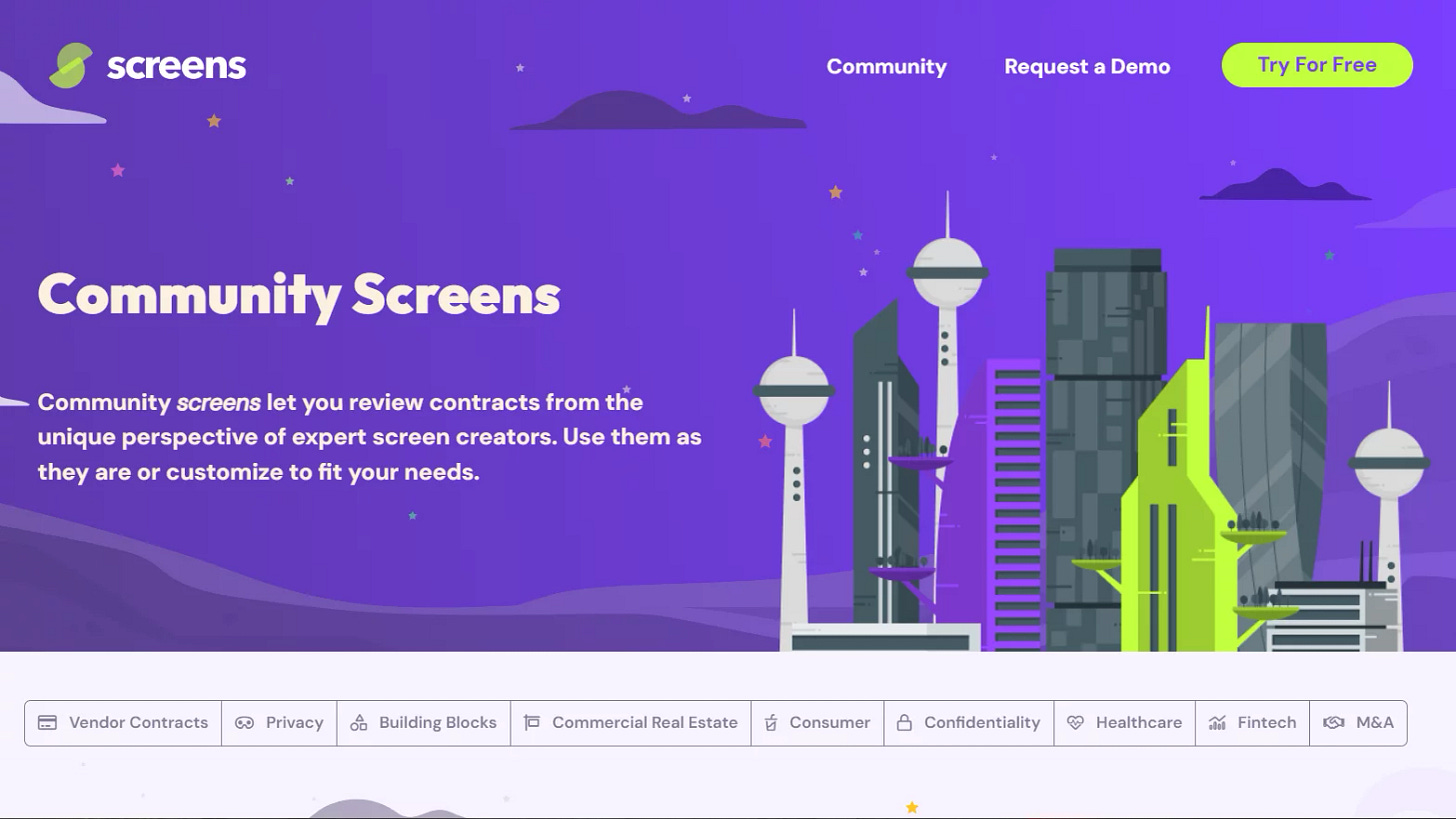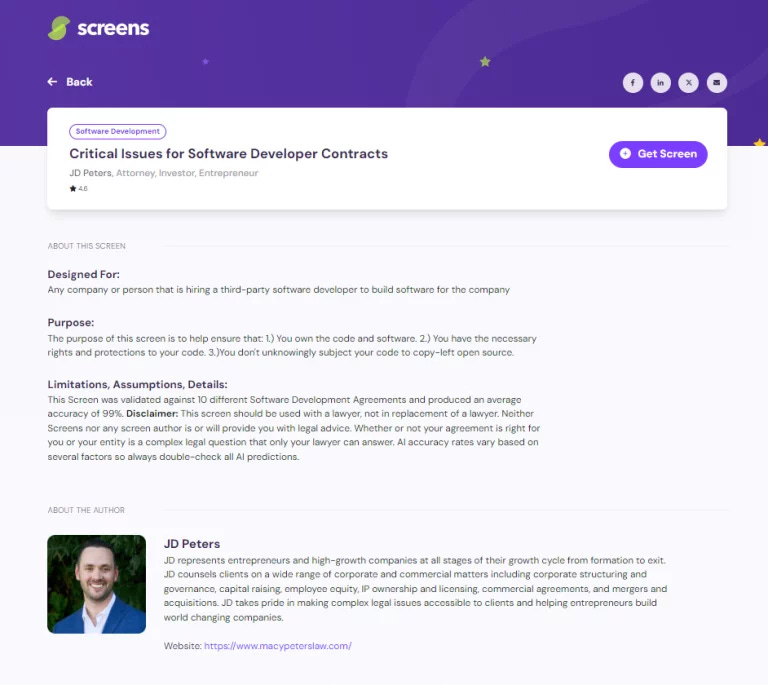Introducing Screens.ai and the Ensuing Wave of "Because AI" Startups
Are we seeing the first wave of AI 2.0?
Hi there, I’m Zach Abramowitz, I’m legally disrupted and, unfortunately, my condition is quite contagious. Consider yourself infected with my viral enthusiasm for Legal AI.
Last year, when ChatGPT launched, I paused all legal startup investing. Today, I’m considering getting back in the game. Ironically, what may have brought me out of retirement is the launch of Screens.ai by TermScout, one of my portfolio startups, and one of the first “Because AI” startups.
Sufficiently Confused?
Well then allow me to elaborate.
First, I’m going to explain what made me pause investing.
Second, I will define what I mean by “Because AI” startups.
Last, I will tell you a little bit about why I am pumped about Screens.ai which, as I mentioned above, is very much “Because AI.”
So, why did I pause investments?
When ChatGPT emerged last year, it sucked all the energy out of the room. I immediately cautioned clients to pause their tech procurement because I believed then, as I do now, that large language models will fundamentally change how we interact with software. At the same time, I expressed concern to all my portfolio companies that these new transformer models like ChatGPT could be existential threats to their business. I was not alone. Savvy investors began to realize that there may not be much moat for startups who were building their own models or even those building on top of these new foundational models like GPT-4. And, as the models improve, they will likely continue to add features that will send other startups to the graveyard. There is already a meme going around about how each time OpenAI releases new features, they also kill off an entire batch of companies.
This has led to a situation where new products that are exponentially better than existing legacy tools may not have a path to funding. Here’s why: once everyone has the models, what stops the market from getting flooded with constantly better and less expensive products? I’m oversimplifying, but models, like the cloud, will ultimately get more powerful but they’re also likely to get commoditized.
All of this uncertainty was enough for me to sit on the sidelines.
Now, I do think there are going to be some attractive investment opportunities in legal, but what I’ve been waiting for are not the AI startups, but rather the “Because AI” startups. Here’s the difference:
AI startups are companies that are, simply put, building AI. It could be a specialized AI, or a UX for AI, or solution to improve the outputs of AI. But the product is AI.
“Because AI” startups, on the other hand, are businesses that would never have worked (no one would even dreamed them up) but for the existence of AI. AI is the enabler, not necessarily the product.
When Large Language Models became all the rage last year, Silicon Valley investor Chamath Palihapitiya continued to mention Warren Buffet’s commentary on refrigeration. Yes, some companies made money inventing refrigeration, but the biggest beneficiaries were companies like Coca-Cola that built empires on the back of refrigeration technology. In this framework, Coca-Cola is a “Because Refrigeration” company.
Airbnb is a great example of a “Because Web” business and is a classic example of Web 2.0. Easily allowing people to rent their homes to complete strangers wasn’t possible without the world wide web. And it wasn’t until 2007, years after AOL, Yahoo and Netscape, that someone even came up with the idea for Airbnb. That’s because it was non-obvious, secondary use case in a world where the web had become more deeply ingrained. In my 2024 predictions newsletter a few weeks back, I mentioned that the more interesting AI 2.0 use cases would begin to emerge this year. “Because AI” is part of that AI 2.0 trend.
Which brings me to the launch of Screens.ai, a new marketplace for AI contract expertise. Need a first pass review of an agreement by an expert in that exact contract type? Screens.ai allows experts to create screens that your business can use to “screen” for undesirable terms.
Now, as an investor, I can tell you that TermScout has been adding blue chip logos and growing revenues at an impressive clip. They work with some of the biggest companies on the planet including IBM, Siemens and NetApp (just to name a few), and their customers love them. So then why, you might ask, are they launching Screens.ai? TermScout founder Otto Hanson explains:
Our mission is to help people easily understand contracts. What we didn’t realize until GPT-4 was that the best way to do that is to create a marketplace for lawyers to build and sell contract review AIs.
Here’s my version: up till now we’ve been building an AI business, now we’re building a “Because AI” business. As an investor, this is music to my ears. Screens is not something anyone would have ever dreamed of before last year’s AI revolution. But, the TermScout team realized that, “Because AI,” they could make an AI marketplace where lawyers could easily train an AI for businesses to get a quick review of an agreement by the most relevant expert. In Hanson’s words:
As recently as 2023, we believed that getting to frictionless contracting would be a long journey. Last year’s generative AI revolution supercharged our progress; and with today’s launch of Screens, lawyers can now create AI digital products with as much time, effort, and technical skill as it takes to write a simple blog post.
Overflow work is a major pain point for businesses of all sizes that has typically been solved by outside counsel and staffing agencies throwing bodies at the problem. Screens.ai gives businesses a better, faster, cheaper solution to contract overflow work by throwing “minds,” not bodies, at the problem. By using screens, businesses get access to the mind of the most relevant expert whose work has been reviewed by the community, and the turn around time is instantaneous.
What we are seeing in real time, then, is AI is creating a new kind of influencer/content creator. These Because-AI creators can distill their knowledge into an AI and then scale that expertise one-to-many. In the same way that Etsy allowed artists to sell their crafts online, Screens will allow contract experts to sell their expertise (or provide it free of charge in some cases). That’s the big vision behind Screens.ai and just one reason I’m so excited about this and other “Because AI” businesses.
There are several other things that have me super excited about Screens.ai, that I will be sharing in upcoming newsletters + I will be having friend of the podcast and Screens founder Otto Hanson back on the Zach Abramowitz is Legally Disrupted Podcast soon to discuss his vision for how businesses can be using Screens. Here are my three asks from you:
Subscribe: To ensure you miss none of upcoming content, go ahead and hit the Subscribe button.
Share: If you enjoyed this newsletter, consider sharing it with someone who’s following AI for Legal.
Comment: And, last, if you’re aware of any other “Because AI” startups in the legal sector or elsewhere, drop them in the comments!
Thanks for letting me disrupt your Sunday. Till next time, stay disrupted my friends — legally disrupted.




